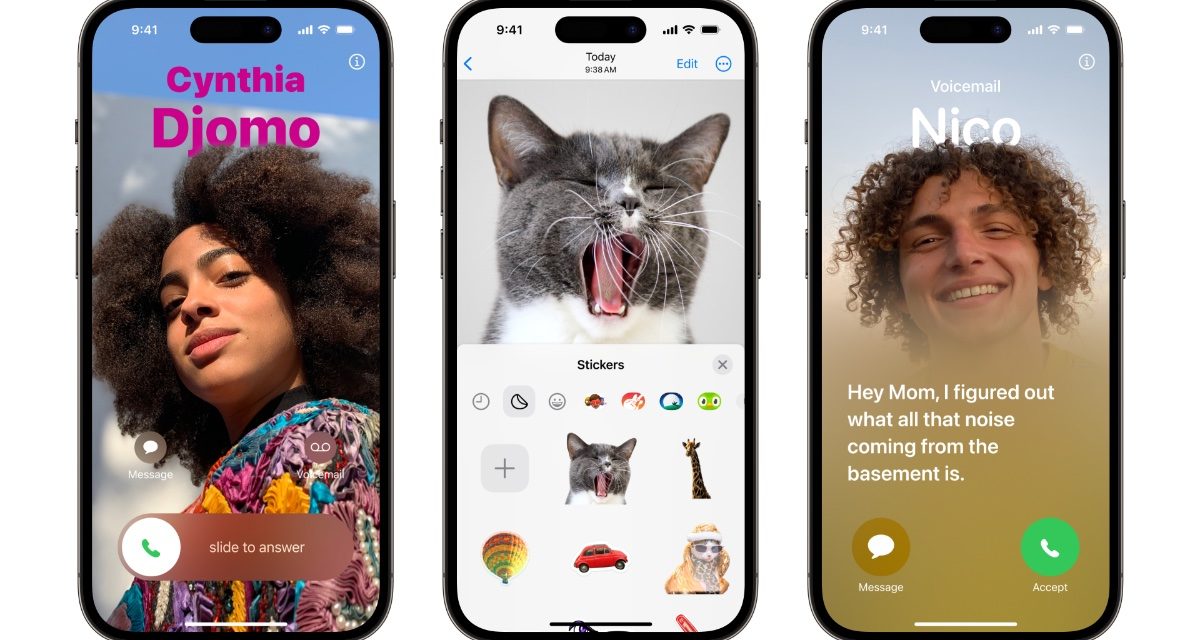As expected, Apple has announced iOS 17 that the tech giant says upgrades the communications experience across Phone, FaceTime, and Messages; makes sharing even easier with AirDrop; and provides more intelligent input that improves the speed and accuracy of typing.
Please enable JavaScript
iOS 17 also introduces new experiences with Journal, an app that makes it easy for people to practice gratitude, and StandBy, a new way to view glanceable information when iPhone is set down and charging, according to Craig Federighi, Apple’s senior vice president of Software Engineering.
The Phone app is central to the iPhone experience, and it receives a big update with personalized Contact Posters, providing a new way for users to express themselves. Users can customize how they appear, bringing a completely new look to incoming calls, and choose treatments for photos or Memoji, as well as typography and font colors. Contact Posters will also be available for third-party calling apps.
Live Voicemail gives users the ability to see real-time transcription as someone leaves a voicemail, and the opportunity to pick up while the caller is leaving their message. Calls identified as spam by carriers won’t appear as Live Voicemail, and will instead be instantly declined. With the power of the Neural Engine, Live Voicemail transcription is handled on-device and remains entirely private, according to Federighi.
FaceTime changes
FaceTime now supports audio and video messages so when users call someone who is not available, they can share a message for later.
FaceTime calls also get more expressive with Reactions such as hearts, balloons, fireworks, laser beams, rain, and more. The new effects can be activated through gestures, and third-party video calling apps can take advantage of them as well.
In an update to Apple TV 4K, FaceTime now extends to television sets. Powered by Continuity Camera, users can initiate a video call directly from Apple TV, or start the call on iPhone and then hand it off to Apple TV, to see friends and family on their television. With Center Stage, users will have perfect framing even as they move around the room, according to Federighi.
Messages updates
Messages gets significant updates with iOS 17, including an all-new stickers experience with new emoji stickers and the ability to create Live Stickers by lifting subjects from photos. Users can also add effects to Live Stickers that bring them to life, and a new drawer in the keyboard puts all of a user’s stickers in one place for access across iOS.
An expandable menu that can be accessed with a tap to display iMessage apps gives Messages a sleeker look, says Federighi. Search gets more powerful and precise with search filters, making it possible for users to start a search and add additional filters to narrow down the results and find exactly what they are seeking, he adds.
A new catch-up arrow indicates where the user last left off in the conversation, and replying inline is as simple as swiping on a text bubble. If a user shares their location, it will update in real time right in the conversation. When sending an audio message, it’s transcribed automatically so users can read it in the moment or listen later.
Messages also introduces Check In, a feature for when a user wants to notify a family member or friend that they have made it to their destination safely. After a user initiates a Check In, their friend or family member will automatically be notified as soon as the user arrives.
If they’re not making progress toward their destination, information will be temporarily shared with the selected contact, such as the device’s location, battery level, and cell service status. Apple says all information that’s shared is end-to-end encrypted.
Sharing with AirDrop and NameDrop
AirDrop makes it easy to share a file with a colleague or send photos to a friend in seconds, and with iOS 17, AirDrop gets new ways to share. NameDrop allows users to share contact information by simply bringing their iPhones together, or by bringing an iPhone and Apple Watch together. With the same gesture, users can also share content or start SharePlay to listen to music, watch a movie, or play a game while in close proximity between iPhone devices.
Improvements to Autocorrect and Dictation
In iOS 17, autocorrect receives an update with a transformer language model, a state-of-the-art on-device machine learning language model for word prediction. This purportedly improves the experience and accuracy for users every time they type. It also receives a refreshed design to better support typing, and sentence-level autocorrections can fix more types of grammatical mistakes.
Users will now receive predictive text recommendations inline as they type, so adding entire words or completing sentences is as easy as tapping the space bar, making text entry faster than ever. Dictation leverages a new speech recognition model to make it even more accurate, says Federighi.
StandBy’s Glanceable Info
iOS 17 introduces StandBy, giving users a full-screen experience with glanceable information designed to be viewed from a distance when iPhone is on its side and charging. The feature can be personalized to display a range of beautiful clock styles, favorite photos, or widgets, including Smart Stacks, which “surface the right widgets at the right time.”
With support for Live Activities, Siri, incoming calls, and larger notifications, StandBy is designed to make the iPhone even more useful when viewed at a distance. When charging with MagSafe, the feature remembers a user’s preferred view. Your can bring up StandBy anytime by tapping the screen, and on iPhone 14 Pro with the Always-On display, it is always available.
New Journal app
Journal is a new app designed to help iPhone users reflect and practice gratitude through journaling. Using on-device machine learning, personalized suggestions can be provided to help inspire a user’s journal entry.
Suggestions are intelligently curated from recent activity, including photos, people, places, workouts, and more. Scheduled notifications can help build a journaling habit.
With the ability to lock the app, the use of on-device processing, and end-to-end encryption, Journal is built to protect a user’s privacy and ensure no one — including Apple — can access a user’s entries, according to Federighi.
Apple says that additional Features in iOS 17 Include:
- Safari adds greater protection for Private Browsing, both from trackers as a user browses, and from people who might have access to a user’s device. Advanced tracking and fingerprinting protections go even further to help prevent websites from tracking or identifying a user’s device. Private Browsing now locks when not in use, allowing a user to keep tabs open even when stepping away from the device.
- For easier and more secure password and passkeys sharing, users can share passwords with a group of trusted contacts. Everyone in the group can add and edit passwords to keep them up to date. Since sharing is through iCloud Keychain, it’s end-to-end encrypted.
- The Health app offers new mental health features. Users can log their daily moods and momentary emotions; see what might be contributing to their state of mind; and easily access depression and anxiety assessments often used in clinics, plus resources available in their region. Additionally, increasing the distance the device is viewed from can help children lower their risk of myopia and gives adult users the opportunity to reduce digital eyestrain. Screen Distancein Screen Time uses the TrueDepth camera to encourage users to move their device farther away after holding it closer than 12 inches from their face for an extended period of time.
- Maps adds offline maps, so users can download a specific area and access turn-by-turn navigation, see their estimated time of arrival, find places in Maps, and more while offline. Maps also makes it easier than ever to discover thousands of trails in parks across the United States, and supports electric vehicle drivers with real-time charging availability information.
- AirTag can be shared with up to five other people, allowing friends and family to keep track of an item in Find My. Everyone in a group will be able to see an item’s location, play a sound, and use Precision Finding to help pinpoint the location of a shared AirTag when nearby. This also works with all other Find My network accessories.
- Apple Music introduces Collaborative Playlists that make listening to music with friends easier than ever before, and SharePlay in the car allows all passengers to easily contribute to what’s playing. Listeners can control the music from their own devices, even if they don’t have an Apple Music subscription.
- Sharing content using AirPlay is even easier with on-device intelligence now learning a user’s preferences. AirPlay will also work with supported televisions in hotels, allowing users to easily enjoy their favorite content on the TV when traveling. Built with a foundation of privacy and security, this capability will be available before the end of the year in select hotels, starting with brands from IHG Hotels & Resorts.
- AirPods receive powerful new features, including Adaptive Audio, Personalized Volume, and Conversation Awareness, that redefine the personal audio experience. Plus, improvements to Automatic Switching and call controls make AirPods even easier to use.
- The Home app adds the ability for users to view up to 30 days of activity history across door locks, garage doors, alarm systems, and contact sensors. Additionally, two popular HomeKit lock features — tap to unlock and PIN codes — are now available for Matter-compatible locks, providing even more ways to connect the home.
- Reminders features a grocery list that automatically groups added items into categories to make shopping easier. Users can change how the items are grouped and the list remembers their preferences.
- Visual Look Up is now available in paused video frames. Now users can identify food, storefronts, signs, and symbols, and lift individual subjects from photos and videos.
- Siri can be activated by simply saying “Siri.” Once activated, users can issue multiple commands in succession without needing to reactivate the assistant.
- In Photos, the People album uses on-device machine learning to recognize more photos of a user’s favorite people, as well as cats and dogs.
- Privacy updates include the expansion of Communication Safety beyond Messages to help keep kids safe when sending and receiving content via AirDrop, Contact Posters, a FaceTime message, and when using the Photos picker to choose content to send. It also expands to cover video content in addition to still images. A new feature, Sensitive Content Warning, helps adult users avoid seeing unwanted nude images and videos. As with Communication Safety, all image and video processing for Sensitive Content Warning occurs on-device, so Apple does not get access to the content.
- Accessibility updates include Assistive Access, a customizable interface that helps users with cognitive disabilities use iPhone with greater ease and independence; Live Speech, which gives nonspeaking users the option to type and have their words spoken in person, or on phone and FaceTime calls; Personal Voice, which gives users at risk of speech loss the option to create a voice that sounds like theirs; and Point and Speak, which helps users who are blind or have low vision read text on physical objects by pointing.
The developer beta of iOS 17 is available to Apple Developer Program members at developer.apple.com starting today, and a public beta will be available next month at beta.apple.com. New software features will be available this fall as a free software update for iPhone XS and later. For more information, visit apple.com/ios/ios-17-preview.
Article provided with permission from AppleWorld.Today





